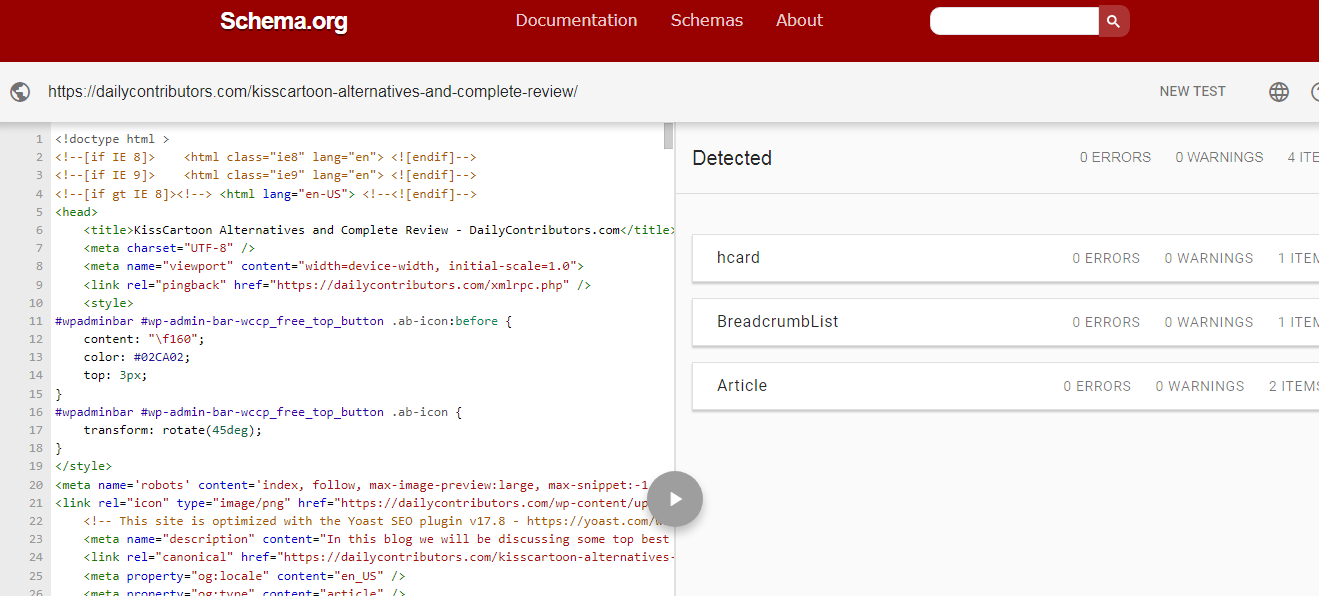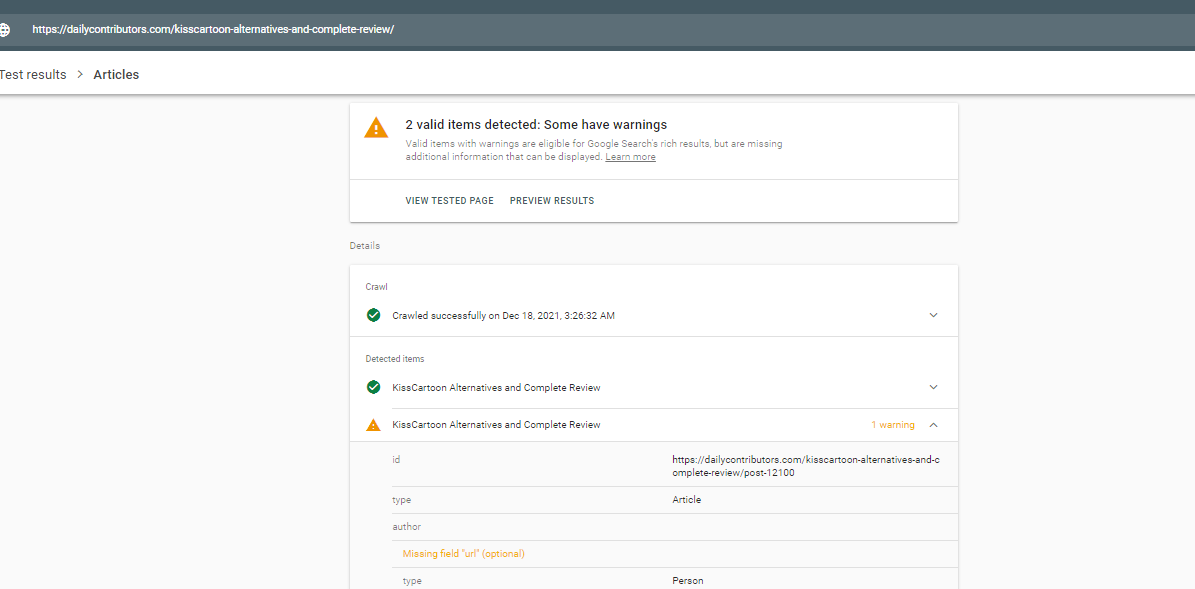Moz Q&A is closed.
After more than 13 years, and tens of thousands of questions, Moz Q&A closed on 12th December 2024. Whilst we’re not completely removing the content - many posts will still be possible to view - we have locked both new posts and new replies. More details here.
Schema Markup Warning "Missing field "url" (optional)"
-
Hello Moz Team, I hope everyone is doing well & good,
I need bit help regarding Schema Markup, I am facing issue in my schema markup specifically with my blog posts,
In my majority of the posts I find error "Missing field "url" (optional)"
As this schema is generated by Yoast plugin, I haven't applied any custom steps.Recently I published a post
https://dailycontributors.com/kisscartoon-alternatives-and-complete-review/
and I tested it at two platforms of schema test
1, Validator.Schema.org
2. Search.google.com/test/rich-resultsSo the validator generate results as follows and shows no error

It shows no error
But where as

in search central results it gives me a warning "Missing field "url" (optional)".
So is this really be going to issue for my ranking ? Please help thanks!
-
@JoeySolicitor I thinks , My website sam with your issue
Got a burning SEO question?
Subscribe to Moz Pro to gain full access to Q&A, answer questions, and ask your own.
Browse Questions
Explore more categories
-
Moz Tools
Chat with the community about the Moz tools.
-
SEO Tactics
Discuss the SEO process with fellow marketers
-
Community
Discuss industry events, jobs, and news!
-
Digital Marketing
Chat about tactics outside of SEO
-
Research & Trends
Dive into research and trends in the search industry.
-
Support
Connect on product support and feature requests.
Related Questions
-
Why Product pages are throwing Missing field "image" and Missing field "price" in Wordpress Woocommerce
I have a wordpress wocommerce website where I have uploaded 100s of products but it's giving me error in GSC under merchant listing tab. When I tested it show missing field image and missing field price. I have done everything according to https://developers.google.com/search/docs/appearance/structured-data/product#merchant-listing-experiences and applied fixed i.e. images are 800x800 and price range is also there. What else can be done here?!merchant listing.jpg
Technical SEO | | Ravi_Rana0 -
What Schema would a Web design/development/seo ageny use and what is the schema.org link?
What Schema would a Web design/development/SEO Ageny use, and what is the schema.org link? I cannot for the life of me figure it out. ProfessionalService has been deprecated.
On-Page Optimization | | TiagoPedreira0 -
What do we know about the "Shops" SERP Feature?
I came across this SERP Feature in a search today on a mobile device. It does not show for the same search query on desktop. What do we know about this "Shops" SERP feature? shops-blur.jpg
SERP Trends | | seoelevated0 -
Looking for live web examples of Medical schema
Has anyone seen a hospital system or medical clinic properly employ schema markup to their sites? This seems like very new territory, and we want to do it right by our client. Are there any best practices I need to look out for?
Web Design | | Madgenius3 -
Ranking penalty for "accordion" content -- hidden prior to user interaction
Will content inside an "accordion" module be ranked as non-hidden content? Is there an official guide by google and other search engines addressing this? Example of accordion element: https://v4-alpha.getbootstrap.com/components/collapse/#accordion-example Will all elements in the example above be seen + treated equally by search engines?
Technical SEO | | houlihanlokey1 -
Rel="Follow"? What the &#@? does that mean?
I've written a guest blog post for a site. In the link back to my site they've put a rel="follow" attribute. Is that valid HTML? I've Googled it but the answers are inconclusive, to say the least.
Technical SEO | | Jeepster0 -
Does the rel="bookmark" tag have any SEO impication?
I'm assuming the rel="bookmark" tag doesn't have any SEO implications but I just wanted to make sure it wasn't viewed like a nofollow by search engines.
Technical SEO | | eli.boda0 -
Why crawl error "title missing or empty" when there is already "title and meta desciption" in place?
I've been getting 73 "title missing or empty" warnings from SEOMOZ crawl diagnostic. This is weird as I've installed yoast wordpress seo plugin and all posts do have title and meta description. But why the results here.. can anyone explain what's happening? Thanks!! Here are some of the links that are listed with "title missing, empty". Almost all our blog posts were listed there. http://www.gan4hire.com/blog/2011/are-you-here-for-good/ http://www.gan4hire.com/blog/2011/are-you-socially-awkward/
Technical SEO | | JasonDGreat MaeM3.png TLcD8.png
0
MaeM3.png TLcD8.png
0